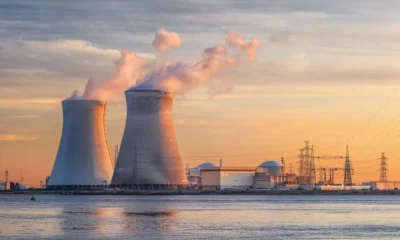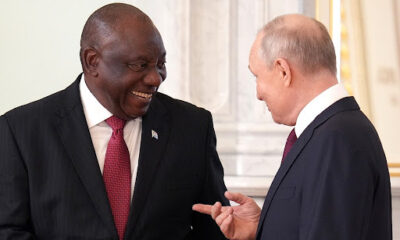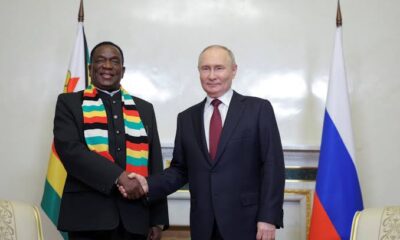Strictly Personal
Russia, Ukraine: What is UN’s relevance? By Emmanuel Onwubiko
Published
2 years agoon

Exactly ten days after the world marked this year’s Saint Valentine’s Day, a day set aside for lovers to mark their solidarity and friendship, the world was thrown into a warfare that is beginning to be predicted as the commencement of World War III.
Russia under the dictatorial hold of their long term President Vladimir Putin declared war on Ukraine and commanded the armed forces of his nation to bombard Ukraine from land, sea and air in an effort to annex the country and stop it from enlisting into the North Atlantic Treaty Organization (NATO).
The opening verbal salvo from the aggressor in chief, was to warn the West to stay off Ukraine and let him achieve his plot to capture Ukraine. The Western democracies have responded with a rash of sanctions and subtle military aids to Ukraine but they can’t physically fight to stop Russia from having its way.
Incidentally, this ongoing invasion of Ukraine is the first real time war in this contemporary epoch that the rest of humanity are watching the military activities on televisions because of the sophistication of the means of broadcasting through cable television and satellite.
What this means is that the war in Ukraine began by Russia is seriously going to affect billions of people in the world just as those who are several thousands of kilometres away are also nursing the fear of this needless war because of the psychological trauma the violence that is being transmitted will unleash on everyone.
For a start, school kids who would also watch the proceedings of this war will even feel the emotional impacts much more than the elders. The President of the USA was the one who alerted that the long predicted military invasion has commenced. This was how some of us got wind of the war that began on February 24, 2022 when President Putin of Russia ordered his troops to bombard, invade and capture eastern Ukraine.
The President of the United States Mr. Joe Biden in a post on the social media wrote: “President Zelenskyy reached out to me tonight and we just finished speaking. I condemned this unprovoked and unjustified attack by Russian military forces. I briefed him on the steps we are taking to rally international condemnation, including tonight at the United Nations Security Council. He asked me to call on the leaders of the world to speak out clearly against President Putin’s flagrant aggression, and to stand with the people of Ukraine. Tomorrow, I will be meeting with the Leaders of the G7, and the United States and our Allies and partners will be imposing severe sanctions on Russia. We will continue to provide support and assistance to Ukraine and the Ukrainian people.”
Boris Johnson of the United Kingdom also said his nation and British people are praying for Ukraine. But the truth is that the combatants are right now killing each other inside Ukraine and the videos are actively transmitted to us.
From the publication Psychology Today by Stephanie A. Sarkis, she said watching violent news video can be hazardous to health. She wrote: “When I was an undergrad earning a degree in telecommunication production, I learned of a saying in TV news: “If it bleeds, it leads.” This means the more violent or anxiety-provoking event is, it draws in more viewers.
If you are watching videos of mass shootings or other violent events on TV or online, you are making yourself more prone to developing (or worsening) depression, anxiety, and post-traumatic stress disorder (PTSD).
When you watch a violent video of mass shootings and other violence, you increase your chances of developing vicarious traumatization. You are bombarding yourself with violent images while not being able to stop or help. This increases your chances of anxiety, depression, chronic stress, and insomnia. If you have PTSD, viewing these videos can cause an increase of symptoms such as flashbacks.
Repetitive viewing of violent news stories can increase fear and anxiety in viewers, and can even cause people to have increased health issues (Vasterman et al. 2005). In a study by Pfefferbaum, et al. (2014), viewing of disasters on television, particularly terrorism, can increase cases of PTSD, depression, anxiety, perceived stress, and even substance use.
In a study by Ahern et al. (2004), people who watched more television images in the seven days after 9/11 had more PTSD symptoms compared to people who had the least amount of viewing.
The traumatic effects of watching distressing images on the news can have a lasting effect. After the 2008 Sichuan Earthquake, adolescents who frequently watched earthquake imagery on the news had a higher rate of probable PTSD at a six-month follow-up (Yeung, et al. 2016)”, she concluded.
The Time Magazine has a comprehensive report of how key nations are responding to the Russian aggression against Ukraine. The magazine said countries across the globe have appealed to Russia to stop its invasion of Ukraine after Russian President Vladimir Putin announced a military operation to protect civilians in the breakaway Republics of Donetsk and Luhansk.
Ukraine’s Embassy in London called Putin’s order an “unprovoked war,” adding that Russia is waging “a war against Europe, a war against the whole world.”
Media reports say that explosions have been heard in the Ukrainian capital Kyiv, in Kharkiv and other areas of the country.
The Russian president warned against foreign intervention in the unfolding conflict. “To anyone who would consider interfering from the outside: if you do, you will face consequences greater than any you have faced in history. All relevant decisions have been taken. I hope you hear me,” Putin says.
The UN says: “The Russian president’s announcement came as the United Nations Security Council was holding an emergency meeting over the crisis in Ukraine. Ambassadors from countries including the U.S., the UK and Albania denounced the escalation of the conflict in the Donbas region in Eastern Ukraine.’’
UN Secretary-General Antonio Guterres attended the meeting, AP reported, and told Russia: “Stop your troops from attacking Ukraine. Give peace a chance.”
The Security Council is chaired by Russia. In a broadcast of the meeting, Sergiy Kyslytsya, Ukraine’s ambassador to the UN, could be heard demanding Russia relinquish its duties as council chair. “Call Putin. Call (Russian foreign minister Sergey) Lavrov to stop aggression.”
U.S. Ambassador Linda Thomas-Greenfield also lamented that Putin had “ordered that last step.”
“As we are gathered in the council seeking peace, Putin delivered a message of war in total disdain for the responsibility of the council,” she said. “The council will need to act and we will put a resolution on the table tomorrow.”
As the meeting ended, Ukraine’s Kyslytsya told the Russian envoy: “There is no purgatory for war criminals. They go straight to hell, ambassador.”
The USA, which has in the last few days provided blow- by- blow intelligence of the plots of Russia against Ukraine has already responded.
In a statement, U.S. President, Joe Biden, called the attack “unprovoked and unjustified,” saying that Russia has chosen a war “that will bring a catastrophic loss of life and human suffering.”
“Russia alone is responsible for the death and destruction this attack will bring, and the United States and its allies and partners will respond in a united and decisive way,” Biden said.
Biden also tweeted that he had spoken to Ukrainian President Volodymyr Zelenskyy. “He asked me to call on the leaders of the world to speak out clearly against President Putin’s flagrant aggression, and to stand with the people of Ukraine.”
The U.S. president added he would be monitoring the situation and will meet with his counterparts in other G7 countries and with U.S. allies in NATO to ensure “a strong united response.”
Ukraine has expressed the desire to join NATO, a move that Putin condemns. NATO can’t physically intervene because the application to enlist in it by Ukraine has yet to be approved and this was the immediate trigger.
This war is not just against Ukraine or Europe but against the relevance or otherwise of the United Nations system which is skewed to favour five Nuclear powers including the current aggressor in Ukraine which is Russia. To demonstrate how comical the UN system is, as Russia invaded Ukraine, Russian permanent Representative to the UN is the President of the UN General Assembly. The UN has condemned the invasion but the Security Council can’t take military action because Russia has veto power as well as China, which tacitly backs Putin in his aggression against Ukraine.
Whilst we have asked probing questions about the relevance of the UN when just one country with the might to launch Nuclear war can just decide to annex smaller nations and the UN can’t stop it. Why then are the nations united if just five members can decide to go rogue and the Heavens won’t fall? The bloodshed in Ukraine is needless and must stop forthwith.
Onwubiko is head of the Human Rights Writers Association Of Nigeria (HURIWA) and was federal commissioner of the National Human Rights Commission Of Nigeria.
You may like
-


Russian state company, Malian junta negotiate nuclear deal
-


Russia eyes more partnership with South Africa as Putin congratulates Ramaphosa
-


Zimbabwe: President Mnangagwa under fire for criticising Russia’s support for Zambia
-


French, Russia, Chinese firms court Ghana amid plan for first nuclear power plant
-


US official accuses Russian troops of entering base housing US military in Niger
-


Russia begins diesel exports to Sudan as EU boycott bites
Strictly Personal
All eyes in Africa are on Kenya’s bid for a reset, By Joachim Buwembo
Published
5 days agoon
July 21, 2024
Whoever impregnated Angela Rayner and caused her to drop out of school at the tender age of 16 with no qualifications might be disappointed that we aren’t asking who her baba mtoto (child’s father) is; whether he became a president, king or a vagabond somewhere, since the girl ‘whose leg he broke’ is now UK’s second most powerful person, 28 years since he ‘stole her goat’.
Angela’s rise to such heights after the adversity should be a lesson to countries which, six decades after independence, still have millions of citizens wallowing in poverty and denied basic human dignity, while the elite shamelessly flaunt obscene luxury on their hungry, twisted faces.
After independence, African countries also suffered their adolescent setbacks in the form of military coups. Uganda’s military rule lasted eight years, Kenya’s about eight hours on August 1, 1982, while Tanzania’s didn’t materialise and its first defence chief became an ambassador somewhere.
What we learn from Angela Rayner is that when you’re derailed, it doesn’t matter who derailed you, because nobody wants to know. What matters is that you pick yourself up, not just to march on, but to stand up and shine.To incessantly blame our colonial and slave-trading ‘derailers’ while we treat our fellow citizens worse than the colonialists did only invites the world to laugh. Have you ever read of a colonial officer demanding a bribe from a local before providing the service due?
African countries today need to press ‘reset’. A state operates by written policies, plans, strategies and prescribed penalties with gazetted prisons for those who break the rules. This is far more power than teenage Angela had, so a reset state should take less time to become prosperous than the 28 years it took her to get to the top after derailing.
So it’s realistic for countries to operate on five-year planning and electoral cycles, so a state that fails to implement a programme in five years has something wrong with it. It needs a reset.
A basic reset course for African leaders and economists should include:
1. Mindset change: Albert Einstein teaches us that no problem can be solved from the same level of consciousness that created it. For example, if you are in debt, seeking or accepting more debt is using the same level of thinking that put you there. If you don’t like Einstein’s genius, you can even try an animal in the bush that falls into a hole and stops digging. Our economists are certainly better than a beast in the bush.
2. Stealing is wrong: African leaders and civil servants need to revisit their catechism or madarasa – stealing public resources is as immoral as rape.
3. Justifying wrong doesn’t make it right: Using legalese and putting sinful benefits in the budget is immoral and can incite the deprived to destroy everything.
4. Take inventory of your resources and plan to use them: If Kenya, for example, has a railway line running from Mombasa to Nairobi, is it prudent to borrow $3.6 billion to build a highway parallel to it before paying off and electrifying the railway?
If Uganda is groaning under a $2 billion annual petrol import bill, does it make sense to beg Kenya for access to import more fuel, when Kampala is already manufacturing and marketing electric buses, while failing to use hundreds of megawatts it generates, yet the country has to pay for the unused power?
If Tanzania… okay, TZ has entered the 21st Century with its electric trains soon to be operating between Dar es Salaam and Morogoro. Ethiopia, too, has connected Addis Ababa to the port of Djibouti with a 753-kilometre electric railway, and moves hundreds of thousands of passengers in Addis every day by electric train.
5. Protect the environment: We don’t own it, we borrowed it from our parents to preserve it for our children. Who doesn’t know that the future of the planet is at stake?
6. Do monitoring and evaluation: Otherwise you may keep doing the same thing that does not work and hope for better results, as a sage defined lunacy.
7. Don’t blame the victims of your incompetence: This is basic fairness.
We could go on, but how boring! Who doesn’t know these mundane points? We are not holding our breath for Angela’s performance, because if she fails, she will be easily replaced. Africa’s eyes should now be on Kenya to see how they manage an abrupt change without the mass bloodshed that often accompanies revolutions.
Strictly Personal
The post-budget crisis in Kenya might be good for Africa, after all, By Joachim Buwembo
Published
2 weeks agoon
July 10, 2024
The surging crisis that is being witnessed in Kenya could end up being a good thing for Africa if the regional leaders could step back and examine the situation clinically with cool-headed interest. Maybe there is a hand of God in the whole affair. For, how do explain the flare not having started in harder-pressed countries such as Zambia, Mozambique and Ghana?
As fate would have it, it happened in East Africa, the region that is supposed to provide the next leadership of the African Union Commission, in a process that is about to start. And, what is the most serious crisis looming on Africa’s horizon? It is Debt of course.
Even the UN has warned the entire world that Africa’s debt situation is now a crisis. As at now, three or four countries are not facing debt trouble — and that is only for now.
There is one country, though, that is virtually debt-free, having just been freed from debt due to circumstances: Somalia. And it is the newest member of the East African Community. Somalia has recently had virtually all its foreign debt written off in recognition of the challenges it has been facing in nearly four decades.
Why is this important? Because debt is the choicest weapon of neocolonialists. There is no sweeter way to steal wealth than to have its owners deliver it to you, begging you, on all fours, to take it away from them, as you quietly thank the devil, who has impaired their judgement to think that you are their saviour.
So?
So, the economic integration Africa has embarked on will, over the next five or so years, go through are a make-or-break stage, and it must be led by a member that is debt-free. For, there is no surer weapon to subjugate and control a society than through debt.
A government or a country’s political leadership can talk tough and big until their creditor whispers something then the lion suddenly becomes a sheep. Positions agreed on earlier with comrades are sheepishly abandoned. Scheduled official trips get inexplicably cancelled.
Debt is that bad. In African capitals, presidents have received calls from Washington, Paris or London to cancel trips and they did, so because of debt vulnerability.
In our villages, men have lost wives to guys they hate most because of debt. At the state level, governments have lost command over their own institutions because of debt. The management of Africa’s economic transition, as may be agreed upon jointly by the continental leaders, needs to be implemented by a member without crippling foreign debt so they do not get instructions from elsewhere.
The other related threat to African states is armed conflict, often internal and not interstate. Somalia has been going through this for decades and it is to the credit of African intervention that statehood was restored to the country.
This is the biggest prize Africa has won since it defeated colonialism in (mostly) the 1960s decade. The product is the new Somalia and, to restore all other countries’ hope, the newly restored state should play a lead role in spreading stability and confidence across Africa.
One day, South Sudan, too, should qualify to play a lead role on the continent.
What has been happening in Kenya can happen in any other African country. And it can be worse. We have seen once promising countries with strong economies and armies, such as Libya, being ravaged into near-Stone Age in a very short time. Angry, youthful energy can be destructive, and opportunistic neocolonialists can make it inadvertently facilitate their intentions.
Containing prolonged or repetitive civil uprisings can be economically draining, both directly in deploying security forces and also by paralysing economic activity.
African countries also need to become one another’s economic insurance. By jointly managing trade routes with their transport infrastructure, energy sources and electricity distribution grids, and generally pursuing coordinated industrialisation strategies in observance of regional and national comparative advantages, they will sooner than later reduce insecurity, even as the borders remain porous.
EDITOR’S PICK


Trevor Noah set for ‘Off the Record’ world tour
South African comedian and talk show host, Trevor Noah, has announced a date for his “Off The Record” global tour...


SA mobility startup LULA acquires UK-based Zeelo’s operations
South Africa’s mobility startup, LULA, has announced the acquisition of the operations of UK-based Zeelo in a move that will...


Ngannou accuses Joshua of employing dirty tactics in their fight in Saudi Arabia
Former UFC heavyweight champion, Francis Ngannou, has accused British-Nigerian boxer, Anthony Joshua, and his promotion team of employing unfair and...


#EndBadGovernance Protests: Please be patient with Tinubu’s govt, monarchs beg Nigerian youths
Some prominent traditional rulers in Nigeria have pleaded with Nigerian youths and organizers of the planned nationwide #EndBadGovernance protests scheduled...


UNESCO removes Senegal’s Niokolo-Koba National Park from list of World Heritage sites in danger
The United Nations’ Educational, Scientific and Cultural Organization (UNESCO) has removed Senegal’s Niokolo-Koba National Park from the list of World...


At Project Aliyense discourse, panelists call for balance between free speech, ethical considerations
The government has been urged to balance freedom of speech with ethical considerations and laws that prevent harm to others....


Adenia Partners acquires Air Liquide’s operations in 12 African countries
Adenia Partners, a leading private equity firm, has completed the acquisition of Air Liquide’s operations in 12 African countries, adopting...


We will handle planned nationwide protests as family matter— Nigerian Govt
The Nigerian government says it will handle the planned #EndBadGovernance protests scheduled to commence on August 1 as a family...


Veteran Nigerian entertainer Charly Boy vows to divorce wife if Kamala Harris doesn’t win US presidential election
Veteran Nigerian entertainer, Charles Oputa, popularly known as Charly Boy, has vowed to divorce his wife of 47 years if...


Saudi club Al Hilal places African transfer record bid for Osimhen
Saudi Arabia club side, Al-Hilal, have reportedly made an African transfer record bid for Super Eagles and Napoli striker, Victor...
Trending
-

 Sports1 day ago
Sports1 day agoMeet Nigerian-born players doing big things for Japan at Paris 2024 Olympics
-

 Tech2 days ago
Tech2 days agoAdenia Partners acquires Air Liquide’s operations in 12 African countries
-

 Metro2 days ago
Metro2 days agoWe will handle planned nationwide protests as family matter— Nigerian Govt
-

 Metro16 hours ago
Metro16 hours ago#EndBadGovernance Protests: Please be patient with Tinubu’s govt, monarchs beg Nigerian youths


